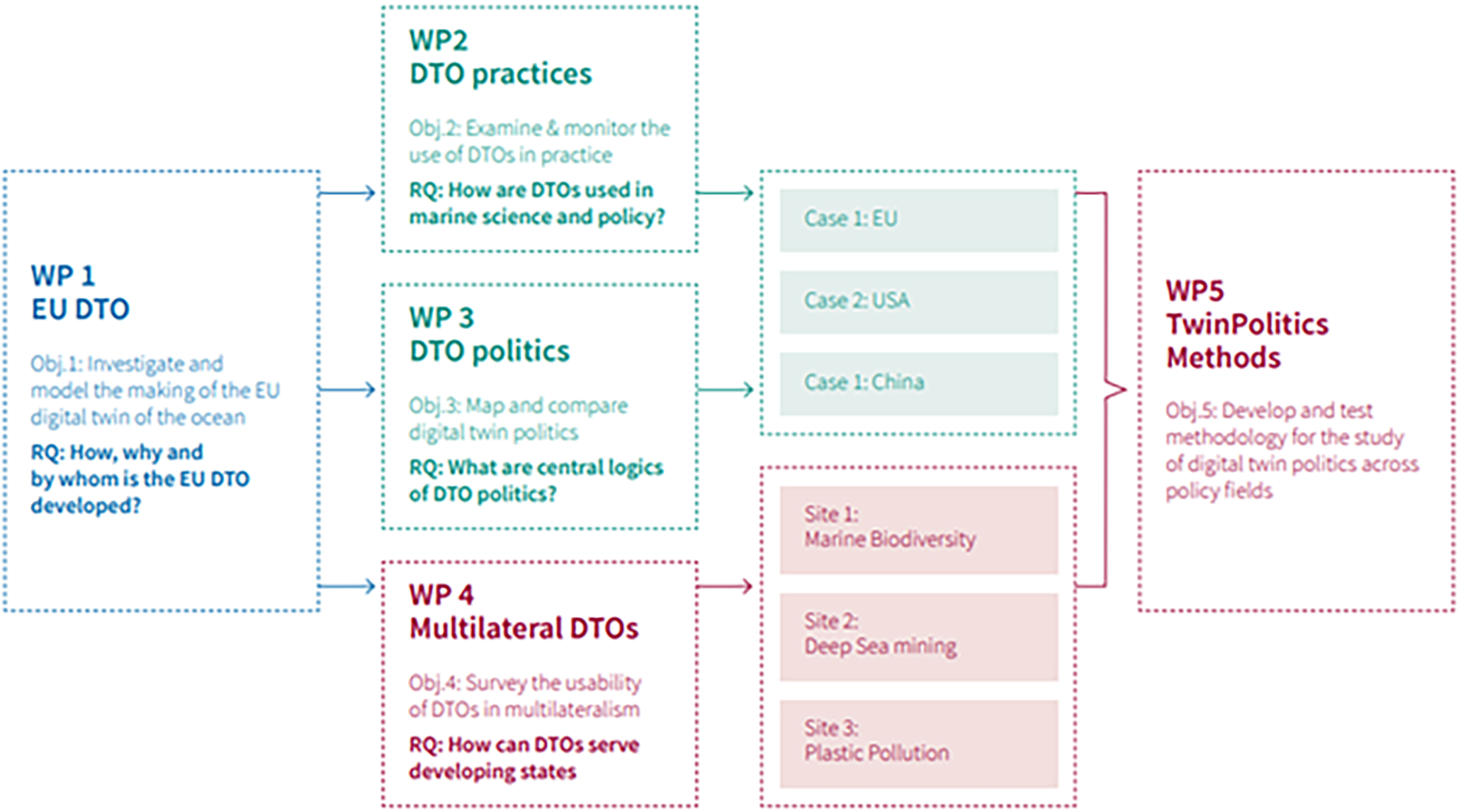TwinPolitics has five specific objectives linked to five interrelated work packages (WPs):
- EU DTO: Investigate and model the making of the EU digital twin of the ocean (WP1)
- DTO Practices: Map the use of DTOs in marine science and policy (WP2)
- DTO Policies: Analyse and compare digital twin policies in the USA, EU, and China (WP3)
- Global DTOs: Examine how DTOs can serve multilateral negotiation processes, with a specific emphasis on assessing the needs of developing states (WP4)
- TwinPolitics Methods: Anticipate the future study and use of DTOs in data-driven multilateral environmental agreement making (WP5).
Work Packages

WP1 models the making of the EU digital twin of the ocean (DTO) and follows its operationalisation on several data collection sites. The methodology will be fine-tuned and research guidelines for all involved research team members developed. Desk research and exploratory interviews will be conducted to identify the main actors and sites for fieldwork. Hybrid ethnography (i.e. participant observation, interviews, and field note-taking) at 3 or 4 DTO-related events and construction and implementation locations will be conducted. The collected data will be stored, interviews will be transcribed, and a preliminary analysis will be conducted. The ethnographic data will be used for socio-technical network mapping and analysis. WP1 will finally visualise EU DTO-making and network relations.
WP2 involves DTO-mapping on the basis of a bibliometric analysis of scientific texts and laboratory ethnography in three marine laboratories in China, the EU, and the USA. WP2 will furthermore compare the data collected with a particular emphasis on the norms, values, and rules of actors using DTOs.
WP3 examines DTO policies through the three case studies of WP2. First, the methodology (critical policy ethnography) will be fine-tuned and described in guidelines for researchers doing fieldwork at specific events where DTOs are presented or discussed by policy-makers. Desk research on the US, the EU, and China will be done and the data collected will be analysed. The data collected in WP3 will be linked to WP2 and inform the development of a survey in WP4.
WP4 explores the usability of DTOs in multilateral decision-making, with a particular emphasis on the needs of developing countries. WP4 will collect data at 3 or 4 negotiation sites, including those related to the Convention on Biological Diversity (CBD), biodiversity beyond national jurisdiction (BBNJ), the ISA, and the UN Treaty on plastic pollution. The methodology employed to investigate the negotiations and conduct onsite surveys of participants will be fine-tuned. Desk research will identify existing digital and data initiatives. Protocols, position papers, and reports of all relevant meetings will be stored and entered into atlas.ti for qualitative analysis purposes. Another aspect of WP4 will be participant observation at two meetings per case study; where possible we will combine on-site participant observation with digital ethnography and a survey. The data collected at the site (observation records and other material) will be entered and stored in atlas.ti, interviews will be transcribed, survey results analysed, and case studies compared.
WP5 synthesises all efforts related to methodological innovation in and across the other work packages. It includes the study of the socio-technical making of DTOs, the joint comparative analysis of DTO practices and policies, and the conceptualisation of ‘digital twin politics’ across policy levels and scales, i.e. from relations between the physical entity (i.e. the real ocean) and the technical artefact (i.e. the ocean’s digital representation) to its actual use by local authorities, citizens, and business actors as well as within the context of multilateral environmental negotiations. WP5 will take methodological innovation forward in the three abovementioned areas, translating the TwinPolitics set of methods across to other sectors, including health, the Earth, and space. To this end, the TwinPolitics team will regularly present its methodological tool kit to experts from these three sectors and engage in the co-design and co-development of a methodology that will make TwinPolitics matter beyond ocean affairs and validate TwinPolitics results.
